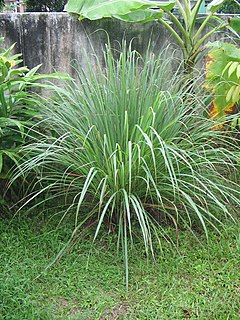
Cymbopogon, also known as lemongrass, barbed wire grass, silky heads, Cochin grass, Malabar grass, oily heads, citronella grass or fever grass, is a genus of Asian, African, Australian, and tropical island plants in the grass family. Some species are commonly cultivated as culinary and medicinal herbs because of their scent, resembling that of lemons . The name cymbopogon derives from the Greek words kymbe and pogon "which mean [that] in most species, the hairy spikelets project from boat-shaped spathes." Lemongrass and its oil are believed to possess therapeutic properties.

Chrysopogon zizanioides, commonly known as vetiver and khus, is a perennial bunchgrass of the family Poaceae.

Cymbopogon flexuosus, also called Cochin grass, East-Indian lemon grass or Malabar grass, is a perennial grass native to India, Sri Lanka, Burma, and Thailand. It is placed in the genus Cymbopogon (lemongrasses).

Lagurus is a genus of Old World plants in the grass family, native to the Mediterranean Basin and nearby regions, from Azores and the Canary Islands to Crimea and Saudi Arabia. It is also naturalized in Australia, New Zealand, Ireland and Great Britain, and scattered locations in the Americas. The only known species is Lagurus ovatus, commonly called hare's-tail, hare's-tail grass or bunnytail. It is also grown as an ornamental plant for its attractive flower panicles.

Bromus hordeaceus, the soft brome, is an annual or biennial species of grass in the true grass family (Poaceae). It is also known in North America as bull grass, soft cheat, and soft chess.

Cymbopogon martinii is a species of grass in the genus Cymbopogon (lemongrasses) native to India and Indochina, but widely cultivated in many places for its aromatic oil. It is best known by the common name palmarosa as it smells sweet and rose-like. Other common names include Indian geranium, gingergrass, rosha, and rosha grass.
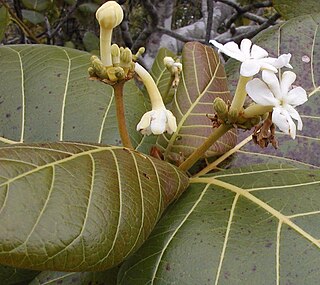
Guettarda speciosa, with common names sea randa, or zebra wood, is a species of shrub in the family Rubiaceae found in coastal habitats in tropical areas around the Pacific Ocean, including the coastline of central and northern Queensland and Northern Territory in Australia, and Pacific Islands, including Micronesia, French Polynesia and Fiji, Malaysia and Indonesia, Maldives and the east coast of Africa. It reaches 6 m in height, has fragrant white flowers, and large green prominently-veined leaves. It grows in sand above the high tide mark.

Bromus ciliatus is a species of brome grass known by the common name fringed brome. It is native to most of North America, including most of Canada, most of the United States except for some portions of the South, and northern Mexico. It is a plant of many habitats, including temperate coniferous forest. The specific epithet ciliatus is Latin for "ciliate", referring to the delicate hairs of the leaf blades.

Atractocarpus fitzalanii, the brown gardenia or yellow mangosteen, is a species of flowering plant in the family Rubiaceae found in tropical Queensland in Australia. The beautifully scented flowers and lush growth has seen this plant enter cultivation in subtropical gardens in Eastern Australia.

Melinis repens is a species of grass known by the common names rose Natal grass, Natal red top, or simply Natal grass. It is native to southern Africa and an introduced species, often considered a noxious weed, on other continents such as North America and Australia. It is an annual or perennial grass, growing up to a meter tall. Its growth rate is dependent on temperature. The inflorescence is an open array of branches bearing spikelets densely coated in silky white or pink hairs.

Festuca vivipara, the viviparous sheep's-fescue, is a species of grass native to northern Europe, northern Asia, and subarctic North America. The specific epithet vivipara is Latin, referring to the florets' alteration to leafy tufts. The plant can have a diploid number of 28, 49, 56, or 63, though numbers of 21, 35, and 42 have also been reported.

Patersonia sericea, commonly known as purple flag or silky purple-flag is a species of plant in the iris family Iridaceae and is endemic to eastern Australia. It is a densely-tufted perennial herb with linear, sword-shaped leaves, broadly egg-shaped, bluish-violet tepals and an oval capsule.

Carex appressa, commonly known as the tall sedge, is a species of flowering plant in the family Cyperaceae, commonly known as sedges.
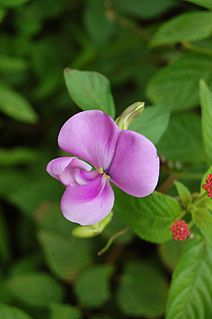
Vigna vexillata, the Zombi pea or wild cowpea, is a variable, perennial climbing plant that is pantropical, found in regions such as Ethiopia, Nigeria, and Venezuela.

Festuca brachyphylla, commonly known as alpine fescue or short-leaved fescue, is a grass native to Eurasia, North America, and the Arctic. The grass is used for erosion control and revegetation. The specific epithet brachyphylla means "short-leaved". The grass has a diploid number of 28, 42, or 44.

Bromus rigidus, the ripgut brome, is a grass native to Eurasia and naturalized in North America. The specific epithet rigidus means rigid or stiff.

Cymbopogon refractus, commonly known as barbed wire grass, is a species of perennial grass in the genus Cymbopogon of the family Poaceae. It is native to Australia.

Capillipedium spicigerum, commonly known as scented-top grass, is a species of perennial grass in the family Poaceae that is native to Australia.
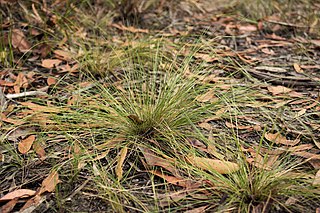
Aristida warburgii is a species of grass that is native to New South Wales and Queensland. It was first described by Carl Christian Mez in 1921 from a specimen collected near Maryborough, Queensland. The species epithet, warburgii, honours Otto Warburg.
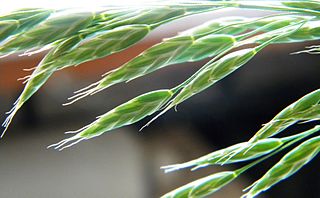
Bromus racemosus, the smooth brome or bald brome, is a species of flowering plant in the family Poaceae. It is native to subarctic and temperate Eurasia, and widely introduced elsewhere, including North America, Iceland, the Southern Cone of South America, the Korean Peninsula, Australia, and New Zealand. It grows in alkaline meadows and in waste places.



















